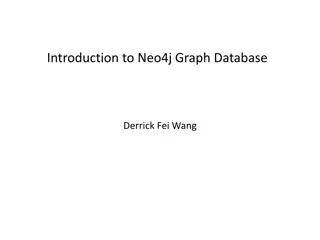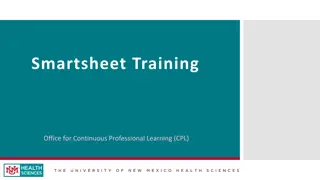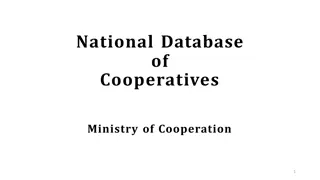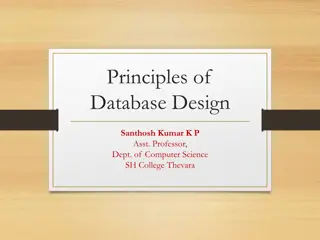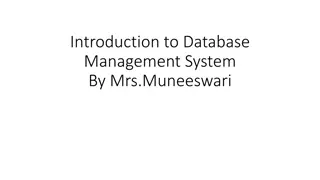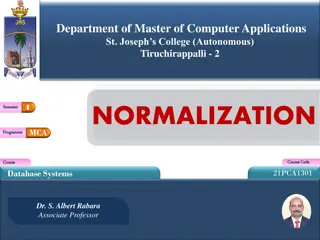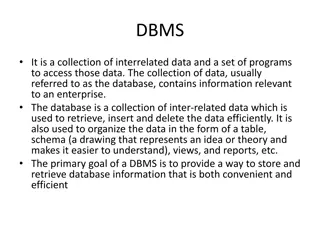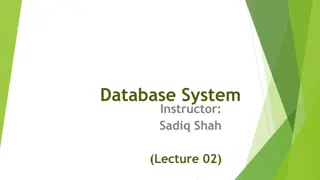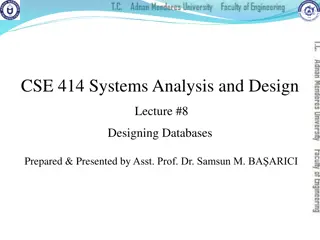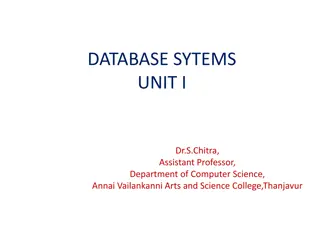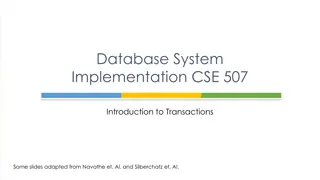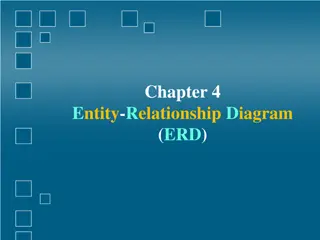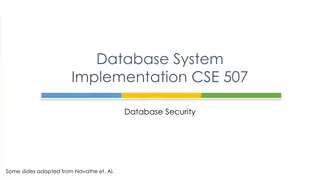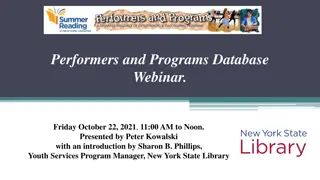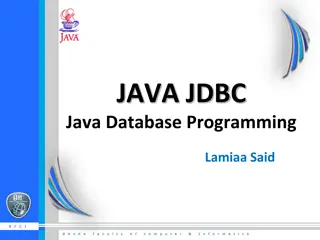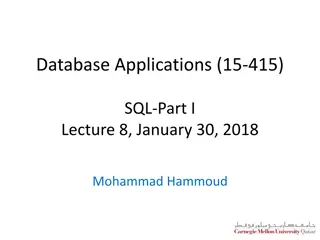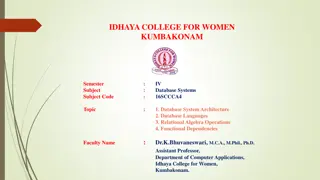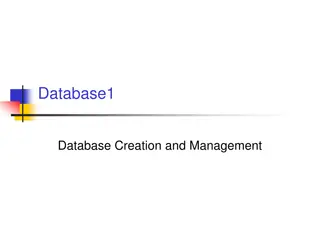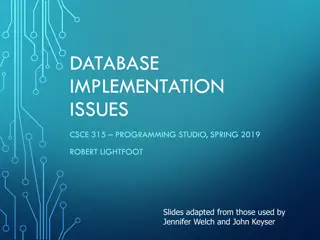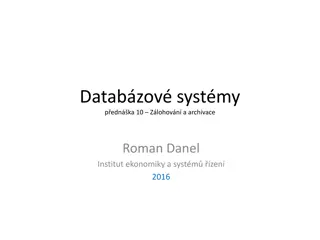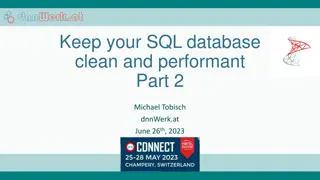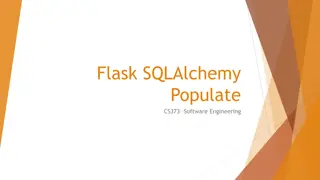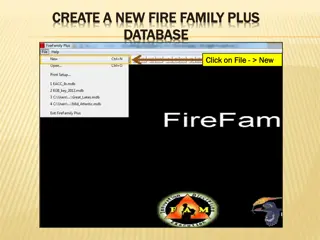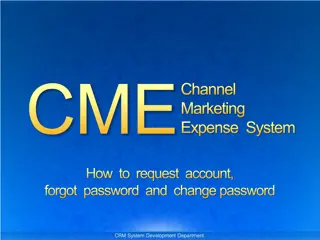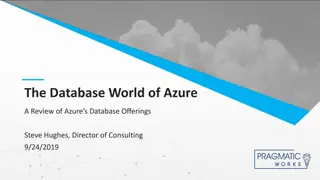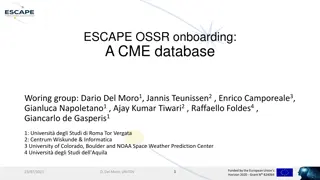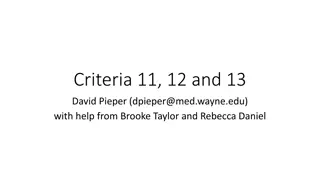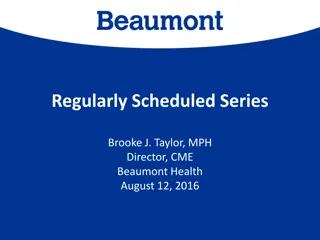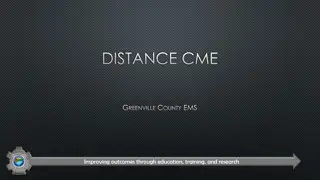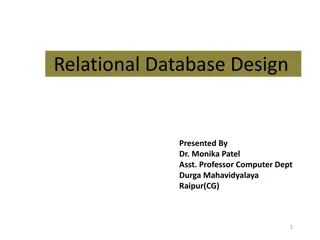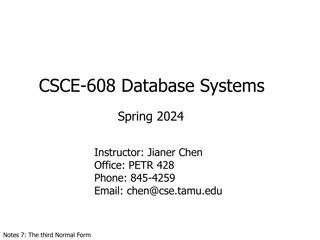Conducting an Outcomes Review Meeting for Program Analysis
This document discusses the process of conducting an outcomes review meeting as a method for program analysis in the context of a CME program. It outlines the objectives, program analysis criteria, and self-study questions related to evaluating the effectiveness of CME activities in meeting the prov
3 views • 28 slides
Understanding Neo4j Graph Database Fundamentals
This comprehensive presentation delves into the fundamentals of Neo4j graph database, covering topics such as the definition of graph databases, reasons for their usage, insights into Neo4j and Cypher, practical applications like data flow analysis, and hands-on instructions on creating and querying
0 views • 20 slides
Understanding Children Missing Education (CME) and its Impact
Explore the statutory duty and purpose of identifying children missing education. Learn about the distinction between children missing education and those missing from education, along with reasons why children may fall into the CME category. Discover the responsibilities of educational provisions,
0 views • 20 slides
Continuous Professional Learning with Smartsheet Training Office for CPL
Access five Smartsheet forms related to your CME credits application, including an Attendance Dashboard and a Sign-in Sheet. Follow step-by-step guidelines for uploading required documents, announcements, and disclosures. Utilize QR codes for efficient attendee sign-ins and credit allocation. Ensure
0 views • 14 slides
Understanding Conflict of Interest in ACCME Accredited Activities
Conflict of Interest (COI) refers to financial relationships that may create biases in Continuing Medical Education (CME) activities when individuals have ties to commercial interests and can influence the content. ACCME requires disclosure to prevent potential bias in CME content. Non-disclosure ca
0 views • 18 slides
National Database of Cooperatives: Ministry of Cooperation Initiatives
The Ministry of Cooperation is developing a National Database of Cooperatives to enhance transparency, governance, and policymaking in the cooperative sector. The database aims to provide comprehensive information on cooperatives across sectors, improve coordination among stakeholders, and facilitat
0 views • 22 slides
Database Design Principles and Management Overview
This document presents an overview of database design principles, including structured, semi-structured, and unstructured data types. It delves into the role of Database Management Systems (DBMS) in defining, constructing, manipulating, and sharing databases effectively. It also covers various types
0 views • 47 slides
Introduction to Database Management System Explained
This presentation covers the basics of database management systems, including definitions of data, types of data, structured and unstructured data, storing data in computers using file systems and database systems, and issues with file systems like data redundancy, inconsistency, difficult data acce
1 views • 18 slides
Understanding Database Normalization and Functional Dependencies
Database normalization is a crucial process that aims to improve database design by organizing data into higher forms of normality. This helps in reducing redundancy and ensuring data integrity. Functional dependencies play a key role in defining relationships between attributes in a database. By un
0 views • 33 slides
Oracle 19c Standard Edition: RAC Migration and Database Solutions Overview
Explore the implications of Oracle Database 19c Standard Edition no longer supporting RAC, and learn about disaster recovery and high availability options for users. Delve into the differences between HA and DR, along with the significance of workload isolation and scalability in database management
3 views • 22 slides
Understanding Database Management Systems (DBMS)
A Database Management System (DBMS) is a crucial tool for organizing, storing, and managing data efficiently. It allows users to create, update, retrieve, and delete data effectively, ensuring data consistency and security. DBMS software like MySQL and Oracle provide interfaces for various database
0 views • 21 slides
Costs and Risks of Implementing a Database Approach
Implementing a database approach involves additional costs and risks that need to be managed effectively. From hiring specialized personnel to dealing with conversion costs and organizational conflicts, organizations must carefully consider the implications of transitioning to a database system. The
0 views • 10 slides
Database Design Process and Concepts
This lecture on designing databases covers the database design process, normalization, transforming E-R diagrams, physical database design concepts, and steps in logical database modeling. It highlights the importance of logical and physical database design in system development, providing insights
0 views • 64 slides
Understanding Entity-Relationship Model in Database Systems
This article explores the Entity-Relationship (ER) model in database systems, covering topics like database design, ER model components, entities, attributes, key attributes, composite attributes, and multivalued attributes. The ER model provides a high-level data model to define data elements and r
0 views • 25 slides
Understanding Database Systems in IT
Database systems play a crucial role in managing and organizing data efficiently. They provide a structured environment for storing and accessing information, enabling various applications in sectors like banking, airlines, universities, sales, and more. The transition from traditional file systems
3 views • 38 slides
Understanding Properties of Database Transactions
Database transactions play a crucial role in ensuring data integrity and consistency within a database system. This content explores the fundamental properties of transactions, such as atomicity, durability, consistency, and isolation. It delves into the requirements and implications of each propert
2 views • 44 slides
Understanding Entity-Relationship Diagrams (ERD) for Database Design
Entity-Relationship Diagrams (ERD) are vital in database design, illustrating entities and their relationships. They help in conceptualizing data models and laying the groundwork for database structures. The process involves identifying entities, defining relationships, and analyzing interactions to
0 views • 40 slides
Database Security Measures and Controls
Database security is crucial to protect against threats like loss of integrity, availability, and confidentiality. Countermeasures such as access control, inference control, flow control, and encryption are important for safeguarding databases. Access control involves creating user accounts and pass
0 views • 35 slides
Performers and Programs Database Webinar - Overview and Features
Learn about the Performers and Programs Database Webinar happening on October 22, 2021. This webinar, presented by Peter Kowalski and introduced by Sharon B. Phillips, offers valuable information about the database's features, including how performers advertise programs, categorization, virtual prog
0 views • 25 slides
Introduction to Database Systems and SQL Programming
Understanding database systems is crucial in today's digital world. Explore the basics of database systems, SQL statements, and Java Database Connectivity (JDBC) in this comprehensive overview. Learn about DBMS, SQL querying, JDBC API, and more to enhance your understanding of managing and interacti
8 views • 24 slides
Understanding SQL: Major Aspects and Functionality in Database Applications
SQL, as a relational database language, offers Data Manipulation Language (DML) and Data Definition Language (DDL) for querying and modifying data. Additionally, SQL encompasses triggers, embedded code execution, remote database access, transaction management, and security features for efficient dat
1 views • 52 slides
Overview of Database Systems Architecture and Languages
A database system is essential for storing and managing an organization's data. The architecture includes components like file manager, database manager, and query processor. Additionally, DML and DDL compilers play crucial roles in handling data manipulation and definition tasks. Various data struc
2 views • 28 slides
Understanding Database Management Systems and Concepts
Explore the world of databases with topics ranging from Database Creation and Management to Basic Database Terms. Learn about the significance of data, information, and metadata in decision-making processes. Discover the purpose of database systems and the role of Database Management Systems (DBMS)
0 views • 25 slides
Database Implementation Issues in Programming Studio
Key topics covered in the slides include database implementation issues, storing data efficiently, and strategies for handling variable length fields in tuple storage. The presentation delves into specialized algorithms for database efficiency and reliability, terminology related to database impleme
0 views • 32 slides
Understanding SQL Server Database Recovery Models and Backup Strategies
Explore the intricacies of SQL Server database recovery models including SIMPLE, BULK-LOGGED, and FULL, along with backup techniques such as full database backups, transaction log backups, and differential backups. Learn about database states, mirror states, and various system databases in SQL Serve
2 views • 24 slides
Efficient SQL Database Maintenance for Performance
Learn to effectively clean and optimize your SQL database for optimal performance. Discover tools like Ola Hallengren's Maintenance Solution and Brent Ozar's First Responder Kit, along with best practices for backup, restore, index optimization, and database integrity checks. Ensure a healthy databa
0 views • 17 slides
Understanding Flask-SQLAlchemy for Efficient Database Management
Flask-SQLAlchemy, a powerful tool for database management in Python, offers a seamless way to interact with databases using object-oriented concepts. By integrating SQLAlchemy's ORM capabilities with Flask, developers can simplify database operations and enhance productivity. This article provides a
0 views • 15 slides
Guide to Importing and Organizing Station Catalogs and Weather Data
This guide provides step-by-step instructions on how to create a new database for fire-related data, name the database, save it in a specific folder, open the database, and import station catalogs and weather data. The process involves creating a fire family plus database, naming and saving it prope
0 views • 18 slides
Comprehensive Guide to CME Channel Marketing Expense System
Detailed instructions on how to request an account, reset a forgotten password, and change passwords for the CME Channel Marketing Expense System. Learn how to prepare for training, request an account, log in, manage proposals, and navigate the system effectively.
0 views • 12 slides
The World of Azure Database Offerings
Exploring Azure's database offerings including Azure Cosmos DB and Azure SQL Database. Azure Cosmos DB provides a globally scalable document database solution, while Azure SQL Database is a great option for SQL Server workloads. Both platforms offer unique features such as low latency, scalability,
0 views • 15 slides
ESCAPE OSSR Onboarding: CME Database Working Group Overview
The ESCAPE OSSR onboarding project focuses on studying Coronal Mass Ejections (CMEs) from the Sun by analyzing data from an ICME database. The team uses various sources to estimate CME sources, evaluate their characteristics, associate CME propagation with Solar Wind types, and more. The database co
0 views • 7 slides
Comprehensive Review of CME Software: The Good, the Bad, and the Ugly
This detailed review delves into various aspects of CME software including features, pros and cons, limitations, and user experiences. It covers topics such as software choices, database management, and challenges in re-creating CME processes. Insights are shared on both recommended and less favorab
0 views • 12 slides
Understanding Children Missing Education (CME) Guidelines
Children Missing Education (CME) refers to children of compulsory school age who are not registered pupils at a school and are not receiving suitable education elsewhere. This raises concerns about the risks they face, such as underachievement, becoming victims of harm/crime, exploitation, or radica
0 views • 13 slides
Accreditation Requirements & Analysis for CME Programs
Accreditation criteria 11, 12, and 13 outlined by David Pieper focus on evaluating learner outcomes, analyzing program effectiveness, and implementing necessary improvements. The process involves assessing changes in competence, performance, and patient outcomes, aligning activities with the CME mis
0 views • 43 slides
Understanding Regularly Scheduled Series in Continuing Medical Education
This presentation provides insights into regularly scheduled series (RSS) in Continuing Medical Education (CME) at Beaumont Health. Topics covered include the background of CME involvement, number of series certified annually, types of credits offered, accreditation requirements, and professional pr
0 views • 29 slides
Distance CME Greenville County EMS Training Programs
Distance CME offered by Greenville County EMS aims to enhance outcomes through education, training, and research. Access the training site by copying and pasting the provided link. Follow the instructions to log in using your work email and default password. Learn how to change your password, explor
0 views • 17 slides
Clinical Investigator Perspectives on Lung Cancer Management: Live CME Event
Clinical investigators including D. Ross Camidge, Stephen V. Liu, Solange Peters, Gregory J. Riely, and David R. Spigel share their insights on lung cancer management at a live CME event in Chicago. The moderator, Neil Love, discloses ties with various commercial interests for educational grants. Th
0 views • 9 slides
AHN CME Webinar Series - Important Updates and Announcements
Providing essential information for participants of the AHN CME Webinar Series on October 7th, 2019. Topics covered include shared computer icon updates, RSS documentation requirements, coordinator turnover protocols, and upcoming CME courses for 2019. Details on account creation and credit receptio
0 views • 7 slides
Understanding Relational Database Design Fundamentals
This content delves into the crucial aspects of relational database design, including normalization, pitfalls, RDBMS design issues, and the overall database design process. It emphasizes the need for well-structured relation schemas to minimize redundancy, ensure data integrity, and facilitate effic
1 views • 53 slides
Understanding Database Normalization and BCNF in Database Systems
Learn about the process of database development, including E-R diagrams, converting to relations, developing database operations, normalization, and BCNF. Explore algorithms for achieving BCNF and example scenarios to understand key concepts in database systems.
0 views • 43 slides

